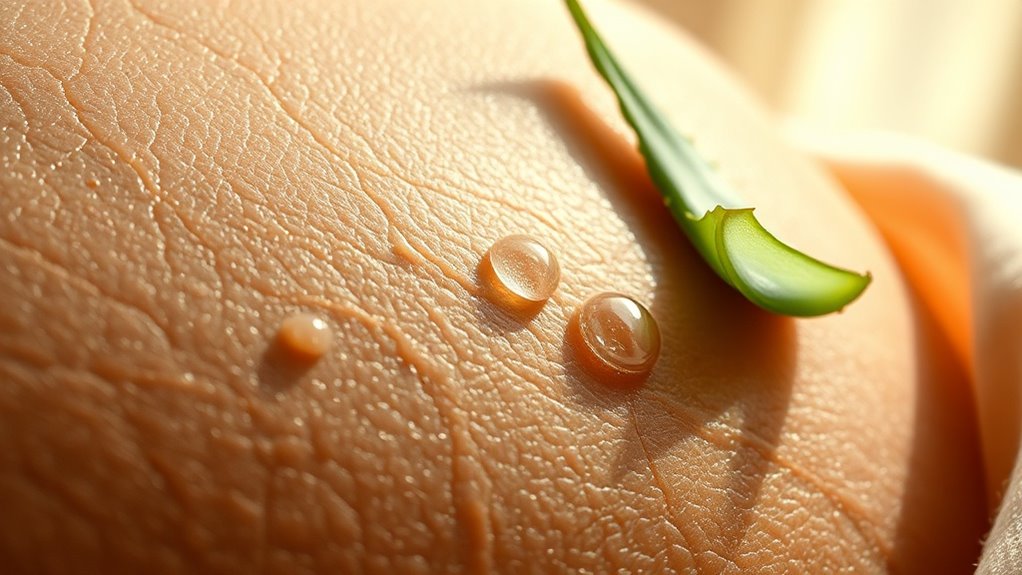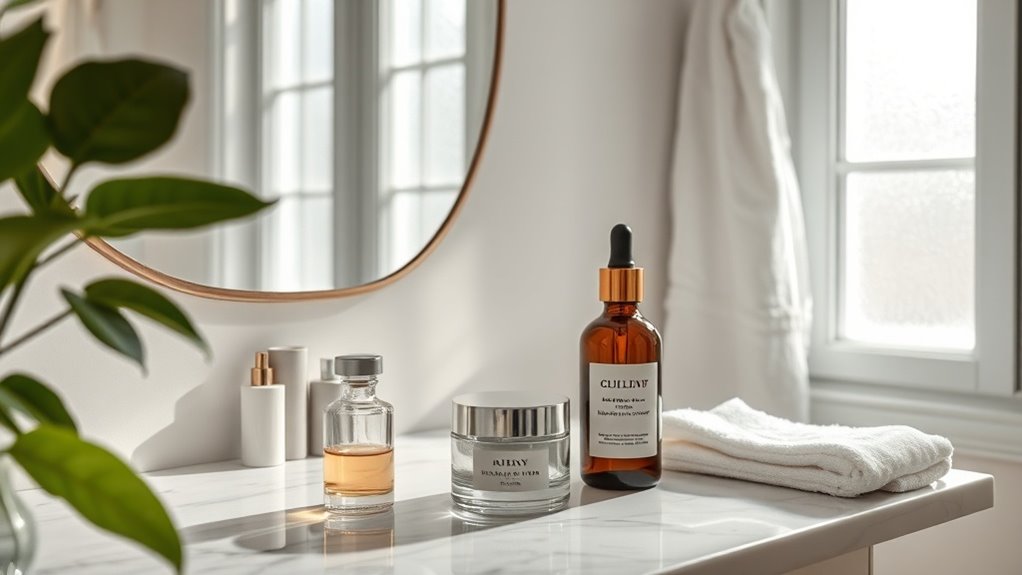Sensitive Skin. This Calming Routine Will Change Everything
If you’ve got sensitive skin, this calming routine can transform it. Start by gently cleansing with lukewarm water and a pH-balanced cleanser to protect your barrier, then apply a ceramide-rich moisturizer and niacinamide serum to soothe redness and hydrate effectively. Incorporate anti-inflammatory foods like berries and omega-3 sources, plus stress management, for lasting comfort. Stick with these steps, and you’ll soon explore ways to build even greater resilience.
Key Takeaways
- Start with a gentle, pH-balanced cleanser using lukewarm water to protect the skin barrier.
- Apply a cool compress to reduce redness and soothe irritation immediately.
- Use ceramide-rich moisturizers twice daily to enhance hydration and strengthen the skin.
- Incorporate niacinamide serums to minimize inflammation and promote calmness.
- Track skin reactions daily and adjust your routine to maintain long-term comfort.
Understanding Sensitive Skin Types
Sensitive skin varies in its triggers and responses, but you can identify your type by recognizing common patterns like reactivity to irritants, allergies to specific ingredients, or heightened sensitivity to environmental factors.
You notice signs such as redness, stinging, or dryness, which indicate your skin’s unique needs. Evidence shows that calm skin requires avoiding harsh chemicals; for instance, studies link certain preservatives to flare-ups. Additionally, avoiding over-exfoliation is crucial to prevent further irritation.
Track your reactions in a journal—it’s a practical tool backed by dermatological research—to classify your type accurately, whether it’s reactive, allergic, or environmentally sensitive, empowering you to protect and maintain calm skin effectively.
By incorporating expert-recommended alternatives, you can avoid common skincare missteps and foster a gentler routine for your sensitive skin.
Key Steps in a Daily Calming Routine
After identifying your skin type, you’ll build a daily calming routine that targets irritation and promotes balance. Avoid over-cleansing as it can exacerbate issues by stripping the skin’s natural oils.
Start with a gentle cleanse using lukewarm water to remove impurities without disrupting your skin’s barrier—this prevents inflammation, as supported by dermatological studies.
Next, apply a soothing technique like a cool compress to reduce redness and calm nerves.
Follow with light hydration to maintain moisture levels, enhancing the skin’s natural defenses.
End by shielding from environmental triggers, such as pollution or sun, through simple protective measures.
Track changes daily and tweak steps for sustained comfort.
For immediate relief, incorporate fast-acting methods using everyday ingredients to provide quick soothing within five minutes.
Essential Products for Soothing Irritation
To effectively soothe irritation, you’ll want to select products that target inflammation and restore your skin’s barrier, drawing from studies like those in the Journal of Investigative Dermatology.
Look for ceramide-rich moisturizers to reinforce barrier function, as clinical trials demonstrate they enhance hydration and reduce sensitivity.
Incorporate niacinamide serums to minimize redness, backed by evidence showing anti-inflammatory effects.
Choose gentle, pH-balanced cleansers to avoid stripping, per dermatological research.
Always opt for fragrance-free formulas to prevent aggravation, ensuring products are tested for efficacy on sensitive skin types. For natural relief, remedies like aloe vera can offer soothing benefits for skin redness and irritation.
In addition, hyaluronic acid plays a crucial role in boosting hydration for sensitive skin, as it is one of the essential ingredients tailored for different skin types in comprehensive skincare explorations.
Natural Remedies to Try at Home
Beyond commercial products, you’ll find natural remedies offer a gentle way to ease irritation in sensitive skin, drawing from herbal traditions and studies like those in Phytotherapy Research. These plant-based options, such as aloe vera and chamomile, deliver proven anti-inflammatory effects without harsh chemicals. You’ll appreciate their simplicity and efficacy for daily use, and many of these ingredients are also effective for tackling dark spots through their natural properties. Here’s a practical table to help you get started:
| Remedy | How to Use | Benefits |
|---|---|---|
| Aloe Vera | Apply fresh gel to irritated areas | Reduces redness and inflammation, per clinical trials |
| Chamomile | Brew tea and apply as a cool compress | Soothes sensitivity with antioxidant properties |
| Oatmeal | Mix into a paste and gently apply | Provides barrier protection and mild exfoliation |
| Green Tea | Use cooled brew as a toner | Offers catechins that calm and protect skin |
| Honey | Dab raw, unprocessed honey on skin | Heals minor irritations with natural antibacterial action |
Incorporate these thoughtfully for optimal results. Moreover, these remedies can support wrinkle reduction by enhancing skin elasticity and promoting a youthful appearance, as explored in natural skin care guides. (125 words)
Lifestyle Habits for Skin Comfort
You play a key role in soothing your sensitive skin by integrating daily hydration habits into your routine, as studies show they maintain the skin’s moisture barrier. It’s important to identify dehydrated skin early to differentiate it from dry skin and apply targeted hydration strategies.
You’ll also benefit from stress management techniques like mindfulness, which research links to reduced inflammation and flare-ups.
Finally, opt for nutritious eating choices rich in antioxidants, helping you fortify your skin’s resilience against irritants.
To enhance your routine, consider incorporating moisturizing products for better skin barrier protection.
Daily Hydration Habits
How can daily hydration habits enhance comfort for sensitive skin?
By drinking at least eight glasses of water daily, you’re bolstering your skin’s moisture barrier, which reduces irritation and inflammation, as evidenced by studies in the Journal of the American Academy of Dermatology.
This internal hydration combats dryness, a key trigger for sensitivity.
Externally, apply a gentle, non-comedogenic moisturizer morning and night to seal in moisture.
Incorporate hydrating foods like spinach and strawberries into your meals for added benefits.
These practical steps promote resilient, comfortable skin without overwhelming your routine.
Stress Management Techniques
While stress can exacerbate sensitivity in your skin by triggering inflammation and flare-ups, as supported by research in the Journal of Investigative Dermatology, simple techniques like deep breathing or mindfulness meditation help mitigate these effects.
These evidence-based practices reduce cortisol and promote skin resilience, making them essential for daily comfort.
-
Practice deep breathing: Inhale deeply for 4 counts, hold, and exhale slowly to lower stress hormones and calm inflammation quickly.
-
Engage in mindfulness meditation: Dedicate 10 minutes daily to focus on the present, fostering emotional balance that supports skin recovery.
-
Try progressive muscle relaxation: Tense and release muscle groups systematically to release tension, easing stress-related skin irritation.
Nutritious Eating Choices
Nutritious eating habits play a key role in soothing sensitive skin, as studies in the Journal of the Academy of Nutrition and Dietetics show that anti-inflammatory foods reduce flare-ups.
You’re incorporating omega-3-rich sources like salmon and flaxseeds into your meals to combat inflammation effectively.
Add antioxidant-packed options such as berries, spinach, and nuts, which shield your skin from damage and promote healing.
Cut back on triggers like processed sugars and dairy, based on evidence from skin health research.
Stay hydrated with water and herbal teas to maintain your skin’s barrier.
Track these changes weekly; you’ll see calmer, more resilient skin as a result.
Long-Term Strategies for Healthy Skin
You build lasting skin health by incorporating evidence-based daily skincare habits, like gentle cleansing and consistent moisturizing, which protect your sensitive barrier over time.
These routines, backed by dermatological studies, minimize irritation and promote resilience in your daily life.
Now, integrate protective lifestyle choices, such as wearing sunscreen and eating nutrient-rich foods, to shield your skin from environmental stressors and ensure long-term vitality. Additionally, regularly audit your skincare products for harmful ingredients that may compromise your skin’s integrity and overall health.
To further optimize your routine and avoid common pitfalls, incorporate targeted treatment to address specific skin concerns effectively.
Daily Skincare Habits
Establishing consistent daily habits forms the cornerstone of long-term skin health, particularly for sensitive types. You’ll reduce inflammation and build resilience by focusing on gentle, evidence-based routines that support your skin’s barrier.
It’s simple yet effective when you prioritize these steps daily.
-
Cleansing gently*: Use a *pH-balanced, non-irritating cleanser morning and night to remove dirt without disrupting your skin’s microbiome, backed by dermatological studies showing reduced sensitivity.
-
Moisturizing effectively: Apply a hypoallergenic cream twice daily to maintain hydration levels, as research indicates this prevents transepidermal water loss and soothes sensitive skin.
-
Product rotation: Alternate formulations seasonally to avoid buildup of potential irritants, ensuring long-term tolerance based on practical skin care guidelines.
Protective Lifestyle Choices
Beyond daily habits, protective lifestyle choices play a key role in safeguarding sensitive skin over time, drawing from research that links habits like sun avoidance and stress reduction to lower inflammation risks.
You can prioritize sun protection by wearing SPF clothing and seeking shade daily, minimizing UV damage per dermatological studies.
Manage stress through mindfulness or exercise, as these lower cortisol and flare-ups.
Adopt an anti-inflammatory diet with omega-3s and antioxidants, supported by nutrition research.
Ensure seven to nine hours of sleep nightly; it boosts skin barrier function, promoting long-term resilience.





